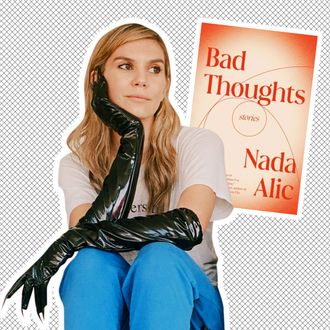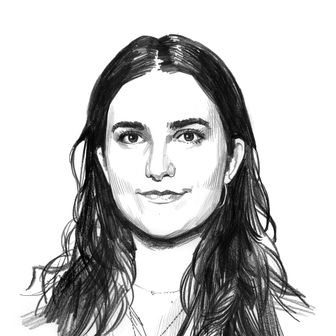
What do we do with the absolutely uncontrollable stream of thoughts having a ticker-tape parade through our brains? The things we’d be embarrassed to say aloud, so we don’t — and yet, it feels like they’re announcing themselves to anyone who glances our way, causing us to stutter our way through small talk and merging into an endless loop of existential crises?
If you’re Nada Alić, you indulge them. You don’t suppress them — you yank them to the surface, imagine the most extreme outcome, and then you write them down. Her debut collection of short stories, Bad Thoughts, is the result. Some of the stories are dark and unsettling, while others are delightfully ridiculous. But throughout, Alić’s deeply funny voice carries us through the total absurdity of today’s world. It’s not easy to make comedy from the anxieties and general horror we’re all experiencing, but she manages to strike a balance — acknowledging how bad the bad truly is while reminding us we can feel mirth too.
Her ability to hold disparate truths can be credited at least in part to her multi-hyphenate identity; she’s the child of Croatian immigrants, was raised in Canada, and herself immigrated to Los Angeles nine years ago. Her incisive yet loving depictions of 20-something society in Los Angeles are vivid, and the unease her characters often feel is visceral. You’re at the bad party, having bad thoughts, and you know that she’s been there too, which makes it all feel sort of okay.
Many of the stories in Bad Thoughts are set in L.A. and especially resonate with anyone who’s spent significant time there. Can you talk about how you draw influence or inspiration from your surroundings?
In L.A. specifically, everyone is such a character. Everyone presents themselves as famous and everyone’s always working on their projects. As an immigrant, I have this weird sort of perspective where I can see a lot of the absurdity and the performance that goes on — and also in the ways that I participate in it too. I just find that it’s so rife for funny moments. A lot of it came from my life and my friends and dating in L.A., which was a nightmare. I’m sure if I still lived in Toronto, I would be seeing it through that lens. I spent my whole 20s fantasizing about living in L.A. and not really knowing how I would even do that. I can see things with a little bit more clarity now. I still love it, though,
Your stories are both deeply existential and very funny — how do you strike that balance?
I see my characters going through a misguided hero’s journey. They’re all seeking freedom or power or love, and going about it in all the wrong ways. One of the main things that I find a lot of humor in is how we perform self. The journey from my thoughts to my mouth feels like a game of telephone sometimes; there’s so much going on internally, and I don’t know if I always communicate it well. I often betray myself, and I think a lot of people do. A lot of it comes from trying to dismantle a lot of the shame that I feel and using humor to normalize the fact that we all have good and bad thoughts swirling inside of us — we have the full spectrum of a human experience. I think a lot of people feel uniquely ashamed and uniquely bad or guilty. Sort of portraying it, even in an absurdist way, can be disarming and allow people to see bits of themselves while also not taking themselves too seriously. I’m able to poke at more weighty, existential things in a way that feels safe or even joyful for people to explore.
Your characters share a sense of detachment, of feeling like an outsider and that being a core identity. Do you see that, and have you felt that in your own life?
I think to a degree, everyone secretly feels maybe like an outsider. Other people are pulling it off better than some — you would never guess. That comes back to being an immigrant, growing up around immigrants, and being forced to coexist in different worlds and figure out how to be. But everyone’s feeling a lot of alienation. Obviously, we’re more isolated and live more atomized lives now. Sometimes it’s a survival mechanism to dissociate and be more detached. We’re always inundated with things that we feel really helpless about, and I think in sharing this, I’m hopefully making people feel like they can relate.
You have experiences within three cultures that I think of as quite disparate: Canadian culture, Croatian culture, L.A. culture. Have you felt the clash of those different identities within yourself, or does it feel like they balance each other?
As I get older, I’m appreciating my culture so much more. It makes me realize why these diasporic communities need to hold on to that culture to have a sense of belonging in a foreign place. I’m seeing the way that that plays out — I find myself listening to old-school Mate Bulić or Prljavo Kazalište and my husband will walk in, and he’ll be like, “What are you listening to? You’re always existing in different worlds.” I think it’s given me a richer perspective. There’s also that spirit of reinvention too that I think I picked up on from my parents. My dad didn’t speak a word of English and was totally on his own, had no family. You really are forced to figure out a new identity for yourself while also still holding on to the old one. So I did that. I didn’t even realize how much I was doing that. In hindsight, when I moved to L.A., I am my father’s daughter in that way where I just had to figure it out. Maybe that’s why I was so interested in performance and trying on different things.
How much of yourself is in your characters?
There’s some core wound or issue that I’m struggling with, and I’ll take that and really exaggerate it and build it out. I sort of think of it as LARPing as these different, terrible people or totally delusional people. It has that crumb of truth — chasing after a guy who just absolutely doesn’t care, or waiting for an email that’s gonna change my life. I’m like, How far can I stretch this out? It’s so funny to me. I’m able to create some distance from it and laugh at myself when I’m being so self-serious. It’s sort of therapeutic.
Can you talk about how other art forms have influenced your writing and about the benefits of a multi-medium approach? How has your artistic community influenced you?
All of my friends are different kinds of artists: musicians, painters, visual artists. In my corporate life, I worked with a lot of visual artists, helping to support them. I’m really lucky in that sense, because their approach to their mediums helps inform and inspire me as well. I have collaborated a lot with other artists. I just really like working with my friends if I can, because writing is so lonely. And it’s just like, really fun. There’s that sort of DIY spirit in L.A.
Your path wasn’t the typical “MFA to debut collection” pipeline; it took you years of working regular jobs and writing on the side to get here. Do you have advice for others taking nontraditional paths?
It takes a really long time. The cool thing about the literary world is that I’m in my mid-30s, and I’m basically a teen. You get to start later. There’s so many other fields where that is not true. I’m friends with a lot of female musicians who really feel the pressure of getting older — there is such an obsession with youth culture here that’s toxic and insane. My best friend and I really lucked out, because she’s a painter, and I’m a writer. We can age gracefully and it doesn’t matter, because I do feel like I’m only getting better every year.
Still, I had to fight against a very loud inner critic, because I didn’t have a container for it, or a framework: Here are the steps to take, and here are people that can help you. I was really just feeling my way around in the dark, in terms of how to navigate it. I do want to talk about that — not to be like, I’m special, but to be like, It is totally possible. You just have to have a punishing level of discipline. A strong Slavic work ethic and Catholic guilt are also helpful.





